人教版高一英语必修一Unit 5 Nelson Mandela Grammar课件(43张)
文档属性
| 名称 | 人教版高一英语必修一Unit 5 Nelson Mandela Grammar课件(43张) |

|
|
| 格式 | zip | ||
| 文件大小 | 2.0MB | ||
| 资源类型 | 教案 | ||
| 版本资源 | 人教版(新课程标准) | ||
| 科目 | 英语 | ||
| 更新时间 | 2020-02-20 00:00:00 | ||
图片预览



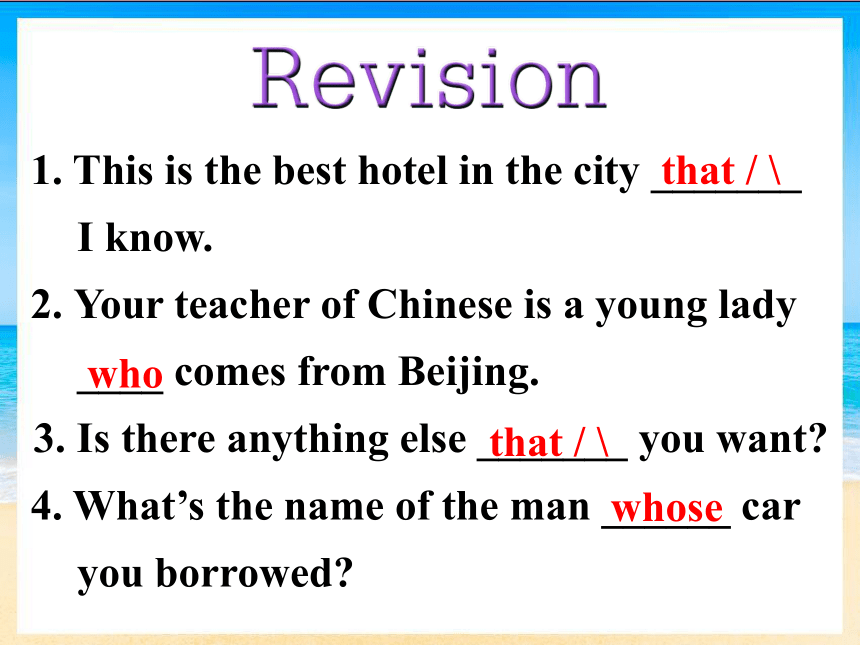
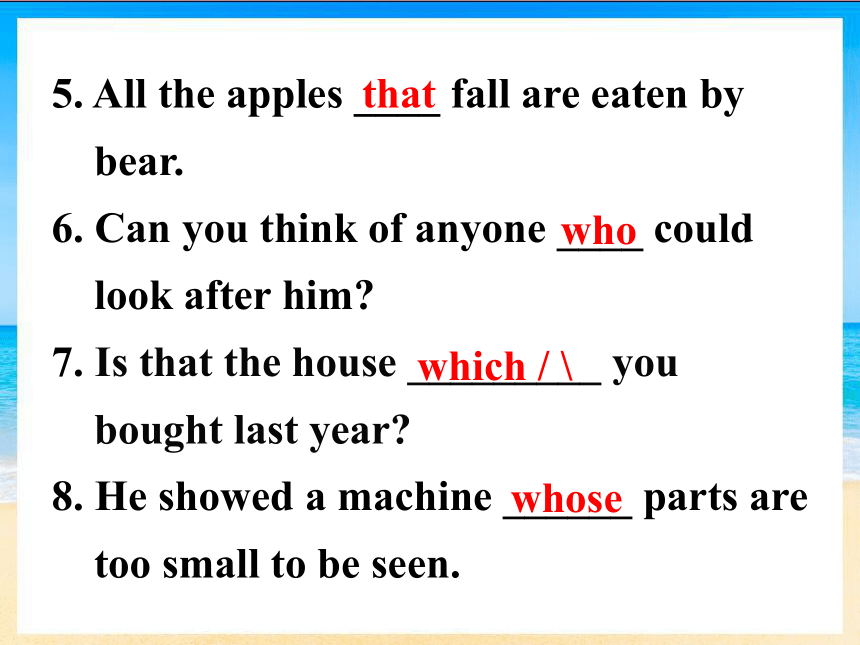

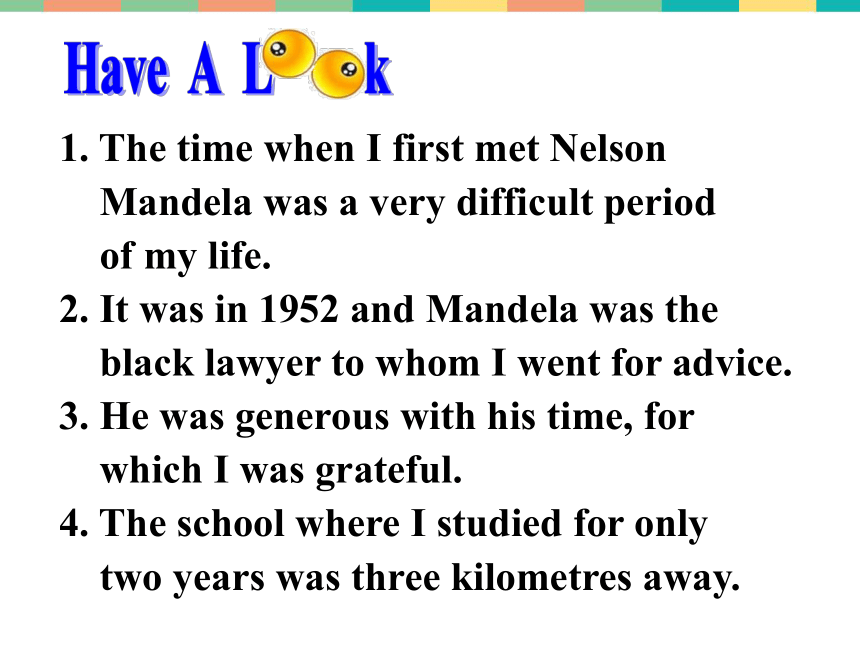
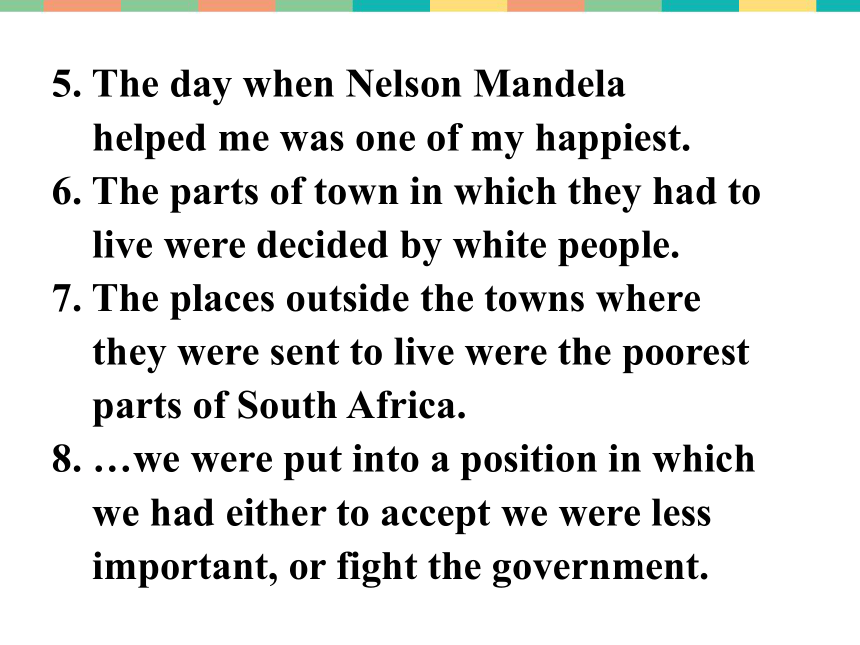
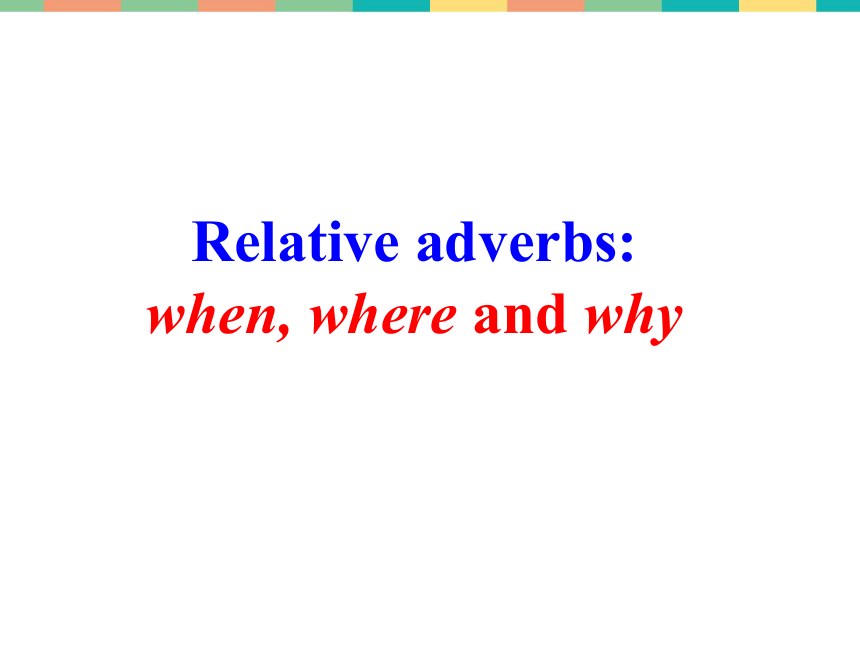
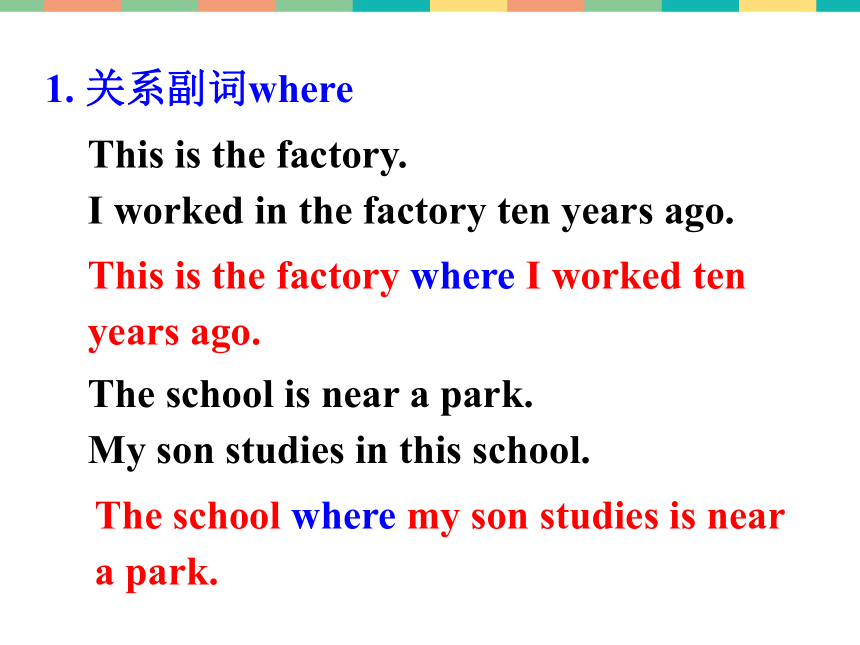
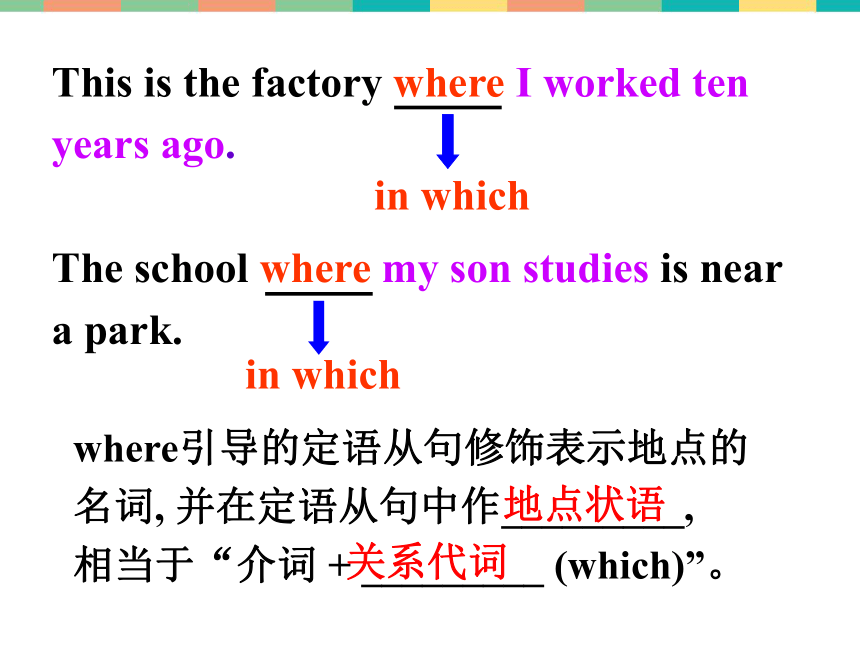
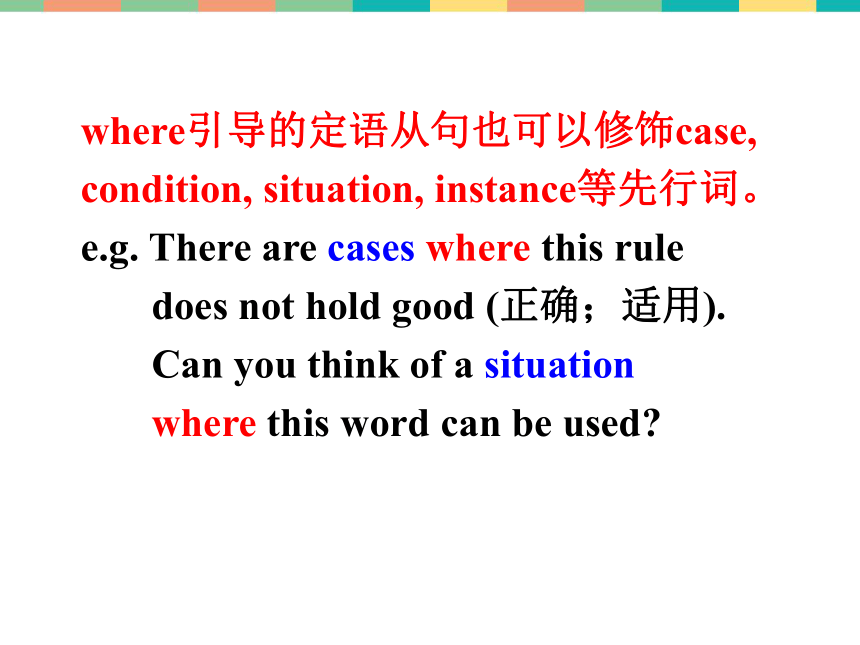
文档简介
课件43张PPT。Unit 5Unit 5
Nelson Mandela
-- a modern hero 1. This is the best hotel in the city _______ I know.
2. Your teacher of Chinese is a young lady ____ comes from Beijing.
3. Is there anything else _______ you want?
4. What’s the name of the man ______ car you borrowed? that / whothat / whose5. All the apples ____ fall are eaten by bear.
6. Can you think of anyone ____ could look after him?
7. Is that the house _________ you bought last year?
8. He showed a machine ______ parts are too small to be seen.thatwhowhich / whoseTo learn the attributive clause with
where, when, why and prep. + which / whom, and use them correctly.1. The time when I first met Nelson
Mandela was a very difficult period
of my life.
2. It was in 1952 and Mandela was the
black lawyer to whom I went for advice.
3. He was generous with his time, for
which I was grateful.
4. The school where I studied for only
two years was three kilometres away.5. The day when Nelson Mandela
helped me was one of my happiest.
6. The parts of town in which they had to
live were decided by white people.
7. The places outside the towns where
they were sent to live were the poorest
parts of South Africa.
8. …we were put into a position in which
we had either to accept we were less
important, or fight the government.Relative adverbs: when, where and whyThis is the factory.
I worked in the factory ten years ago. 1. 关系副词whereThis is the factory where I worked ten years ago.The school is near a park.
My son studies in this school. The school where my son studies is near a park.where引导的定语从句修饰表示地点的名词, 并在定语从句中作_________,
相当于“介词 + _________ (which)”。This is the factory where I worked ten years ago.
The school where my son studies is near a park.in whichin which地点状语关系代词where引导的定语从句也可以修饰case, condition, situation, instance等先行词。
e.g. There are cases where this rule
does not hold good (正确;适用).
Can you think of a situation
where this word can be used?They’ll never forget July 1.
Hong Kong returned to its motherland on July 1. 2. 关系副词whenThey’ll never forget July 1 when Hong Kong returned to its motherland.The days are gone forever.
We lived together happily during those days.The days when we lived together happily are gone forever.when引导的定语从句修饰表示时间的
名词, 在定语从句中作 _________, 相当
于“介词 + _________ (which)”。They’ll never forget July 1 when Hong Kong returned to its motherland.The days when we lived together happily are gone forever.on whichduring which时间状语关系代词There are many reasons.
People like traveling for many reasons. 3. 关系副词whywhy引导的定语从句修饰先行词 reason, 在从句中作原因状语, 相当于“for + which”。There are many reasons why people like traveling.for which 在the reason why … 结构中,why引
导定语从句,它也可以换为for
which。在从句中做原因状语。
2. 如果关系代词指代先行词reason在从
句中做主语、宾语、表语等时,则用
that或which。
3. the reason is that … 结构中,只能用
that引导表语从句,不要受汉语的影
响,误用because。timeadverbial of timeplacereasonadverbial of placeadverbial of reasonElias had some messages for his
friends. Please help him complete
the sentences. The mines why I got a job was the 5th of
August.
The reason where I worked was because of
my hard work.
The time when I joined the were 9 km from
ANC Youth League my home.
The government
building where we voted was late at
night.
The date when I arrived was very tall.1. Beijing is the place _______________ I was born.
2. Is this the reason ______________ he refused our offer?
3. I will never forget the day _________
______ I first met you on the seashore.
4. There are occasions ______________ one must yield. where (in which)why (for which)when (onwhich)when (on which)Fill in the blanks.n. 场合; 时机 on … occasion: 在 …… 时刻/场合Further StudyLook at the sentences and think
about why they use different relatives.a. This is the place where he works.
This is the place which / that we visited last year.
b. That was the day when he arrived.
Do you still remember the day that/which we spent together?
c. This is the reason why he left.
The reason that/which he gave us was quite reasonable.选择定语从句的关系词一定要看先行词在从句中所做成分。当先行词在从句中作状语,则选择相应的关系 _____。当先行词在从句中作主语, 宾语或表语, 则选择相应的关系 _____。副词代词Preposition + which
Preposition + whomWe could expect good decisions from you. We thought you were such a person.We thought you were such a person from whom we could expect good decisions.prep.object of prepositionprep.relative pronoun
Study and ObserveYou were to buy dog food with the money. The money is gone.The money with which you were to buy dog food is gone.prep.object of prepositionprep.relative pronoun
We use a preposition to begin an attributive clause when the relative pronoun (which or whom) is the object of the preposition.
当关系代词在定语从句中充当介词的宾语时,我们用介词+关系代词(whom或 which)引导定语从句。如果指人,用介词+whom;如果指物,用介词+which。A. This is the boy _____ whom I played
tennis yesterday. How to choose the right prepositions?Find out which verb the preposition is
used with. For example:B. He is the man _____ whom you should
give your thanks.withtoA. The farm ___ which we worked ten
years ago isn’t what it used to be. 2. Find out which noun or pronoun the
clause modifies. For example: B. This is the tree ______ which we
used to play games.onunder3. Find out the meaning of the clause.
For example: The pen ______ which he is writing
now was bought yesterday.B. The gas _______ which we can not
live is called oxygen.(He is writing with the pen.)(We can not live without the gas.)withwithout 当关系代词做listen to, look at, depend on, pay attention to, take care of 等不能拆开的短语动词的宾语时, 在定语从句中一般不宜将介词提前。
e.g. This is the boy whom she has taken care of. Complete the following sentences
using “preposition +which/ whom”.1. This is the rock ___________ the boy fell down into the sea.
2. The film star ___________ we talked a lot yesterday will give us a speech tomorrow.
3. The West Lake _________ Hangzhou is famous in the world will be more beautiful.
4. The subject ________ Xiao Wang is good is physics.from whichabout whomfor whichat which5. The reason _________ he could not go there was that his grades was too low.
6. The professor __________ Mr. Smith shook hands yesterday has made new discoveries in science.
7. Could you tell me the day ________ you arrived?
8. I will treasure the days ______________ I lived here.with whomon whichin which/duringfor which1. The person with whom ______ (我和他住在一起) was a good friend of mine.
2. The house in which ____________ (我居住的) was far away from my work.
3. The company for which ________ (我工作的) was founded five years ago.I livedI was stayingI workedComplete the following sentences using attributive clause.4. The address to which _______________
____ (我的信件被发送到的) was in South Africa.
5. The team for which _____________ (我为 之做研究的) is the best in China.
6. The scientist from whom ________ (我向 他学习的) never lost heart when he was in trouble. my letters wereI did researchI learnedsent本课时涉及的要点是以where, when,
why, 介词+which, 介词+whom引导的
定语从句的用法。时间 when = in/at/on … which
地点 where = at/in … which
原因 why = for … which“when” means “at that time”,
“where” means “at that place”,
“why” is used after the word “reason”. I. 用关系副词或“介词+ which / whom”将下面两个句子合成一个含有定语从句的复合句。
1. He came last night. I was out at that time.
2. The place was a thick forest. The prince
met Emily there.He came last night _________________
_____________.The place _______________________
__________ was a thick forest.where/in which the princemet Emilywhen/at which Iwas out3. Tom refused to tell us the reason. He left
his job for that reason.
4. The person died three years ago. This
letter was addressed to him.Tom refused to tell us the reason ______
_____________________. The person _________________ was addressed died three years ago. for which he left his jobto whom this letterwhy/II.?用适当的关系词补全下面短文。
Children are always happy on the day 1. ______ summer vacation begins. They think about the plans 2. __________ they have for the summer. Some children go to a day camp 3. __________ is near their home. At the end of the day, they can go home.?Other kids choose to go to a camp in the country 4. ______ they are instructed by camp counselors. where? ?whenthat/whichwhich/thatThese counselors are often college students 5. ________ are trying to earn a little extra money during their summer vacation. Some kids go to specialized (专业的) camps. There they can improve a particular skill or learn a new hobby 6. __________ they are interested in. This is the reason 7. _____ specialized camps are popular with both parents and kids. why??who/thatwhich/thatThere are some kids 8. _______ parents take them on a trip in a car. They often visit state and national parks. whose ? ?? Finish Exercises 1-2 on Page 71.
Nelson Mandela
-- a modern hero 1. This is the best hotel in the city _______ I know.
2. Your teacher of Chinese is a young lady ____ comes from Beijing.
3. Is there anything else _______ you want?
4. What’s the name of the man ______ car you borrowed? that / whothat / whose5. All the apples ____ fall are eaten by bear.
6. Can you think of anyone ____ could look after him?
7. Is that the house _________ you bought last year?
8. He showed a machine ______ parts are too small to be seen.thatwhowhich / whoseTo learn the attributive clause with
where, when, why and prep. + which / whom, and use them correctly.1. The time when I first met Nelson
Mandela was a very difficult period
of my life.
2. It was in 1952 and Mandela was the
black lawyer to whom I went for advice.
3. He was generous with his time, for
which I was grateful.
4. The school where I studied for only
two years was three kilometres away.5. The day when Nelson Mandela
helped me was one of my happiest.
6. The parts of town in which they had to
live were decided by white people.
7. The places outside the towns where
they were sent to live were the poorest
parts of South Africa.
8. …we were put into a position in which
we had either to accept we were less
important, or fight the government.Relative adverbs: when, where and whyThis is the factory.
I worked in the factory ten years ago. 1. 关系副词whereThis is the factory where I worked ten years ago.The school is near a park.
My son studies in this school. The school where my son studies is near a park.where引导的定语从句修饰表示地点的名词, 并在定语从句中作_________,
相当于“介词 + _________ (which)”。This is the factory where I worked ten years ago.
The school where my son studies is near a park.in whichin which地点状语关系代词where引导的定语从句也可以修饰case, condition, situation, instance等先行词。
e.g. There are cases where this rule
does not hold good (正确;适用).
Can you think of a situation
where this word can be used?They’ll never forget July 1.
Hong Kong returned to its motherland on July 1. 2. 关系副词whenThey’ll never forget July 1 when Hong Kong returned to its motherland.The days are gone forever.
We lived together happily during those days.The days when we lived together happily are gone forever.when引导的定语从句修饰表示时间的
名词, 在定语从句中作 _________, 相当
于“介词 + _________ (which)”。They’ll never forget July 1 when Hong Kong returned to its motherland.The days when we lived together happily are gone forever.on whichduring which时间状语关系代词There are many reasons.
People like traveling for many reasons. 3. 关系副词whywhy引导的定语从句修饰先行词 reason, 在从句中作原因状语, 相当于“for + which”。There are many reasons why people like traveling.for which 在the reason why … 结构中,why引
导定语从句,它也可以换为for
which。在从句中做原因状语。
2. 如果关系代词指代先行词reason在从
句中做主语、宾语、表语等时,则用
that或which。
3. the reason is that … 结构中,只能用
that引导表语从句,不要受汉语的影
响,误用because。timeadverbial of timeplacereasonadverbial of placeadverbial of reasonElias had some messages for his
friends. Please help him complete
the sentences. The mines why I got a job was the 5th of
August.
The reason where I worked was because of
my hard work.
The time when I joined the were 9 km from
ANC Youth League my home.
The government
building where we voted was late at
night.
The date when I arrived was very tall.1. Beijing is the place _______________ I was born.
2. Is this the reason ______________ he refused our offer?
3. I will never forget the day _________
______ I first met you on the seashore.
4. There are occasions ______________ one must yield. where (in which)why (for which)when (onwhich)when (on which)Fill in the blanks.n. 场合; 时机 on … occasion: 在 …… 时刻/场合Further StudyLook at the sentences and think
about why they use different relatives.a. This is the place where he works.
This is the place which / that we visited last year.
b. That was the day when he arrived.
Do you still remember the day that/which we spent together?
c. This is the reason why he left.
The reason that/which he gave us was quite reasonable.选择定语从句的关系词一定要看先行词在从句中所做成分。当先行词在从句中作状语,则选择相应的关系 _____。当先行词在从句中作主语, 宾语或表语, 则选择相应的关系 _____。副词代词Preposition + which
Preposition + whomWe could expect good decisions from you. We thought you were such a person.We thought you were such a person from whom we could expect good decisions.prep.object of prepositionprep.relative pronoun
Study and ObserveYou were to buy dog food with the money. The money is gone.The money with which you were to buy dog food is gone.prep.object of prepositionprep.relative pronoun
We use a preposition to begin an attributive clause when the relative pronoun (which or whom) is the object of the preposition.
当关系代词在定语从句中充当介词的宾语时,我们用介词+关系代词(whom或 which)引导定语从句。如果指人,用介词+whom;如果指物,用介词+which。A. This is the boy _____ whom I played
tennis yesterday. How to choose the right prepositions?Find out which verb the preposition is
used with. For example:B. He is the man _____ whom you should
give your thanks.withtoA. The farm ___ which we worked ten
years ago isn’t what it used to be. 2. Find out which noun or pronoun the
clause modifies. For example: B. This is the tree ______ which we
used to play games.onunder3. Find out the meaning of the clause.
For example: The pen ______ which he is writing
now was bought yesterday.B. The gas _______ which we can not
live is called oxygen.(He is writing with the pen.)(We can not live without the gas.)withwithout 当关系代词做listen to, look at, depend on, pay attention to, take care of 等不能拆开的短语动词的宾语时, 在定语从句中一般不宜将介词提前。
e.g. This is the boy whom she has taken care of. Complete the following sentences
using “preposition +which/ whom”.1. This is the rock ___________ the boy fell down into the sea.
2. The film star ___________ we talked a lot yesterday will give us a speech tomorrow.
3. The West Lake _________ Hangzhou is famous in the world will be more beautiful.
4. The subject ________ Xiao Wang is good is physics.from whichabout whomfor whichat which5. The reason _________ he could not go there was that his grades was too low.
6. The professor __________ Mr. Smith shook hands yesterday has made new discoveries in science.
7. Could you tell me the day ________ you arrived?
8. I will treasure the days ______________ I lived here.with whomon whichin which/duringfor which1. The person with whom ______ (我和他住在一起) was a good friend of mine.
2. The house in which ____________ (我居住的) was far away from my work.
3. The company for which ________ (我工作的) was founded five years ago.I livedI was stayingI workedComplete the following sentences using attributive clause.4. The address to which _______________
____ (我的信件被发送到的) was in South Africa.
5. The team for which _____________ (我为 之做研究的) is the best in China.
6. The scientist from whom ________ (我向 他学习的) never lost heart when he was in trouble. my letters wereI did researchI learnedsent本课时涉及的要点是以where, when,
why, 介词+which, 介词+whom引导的
定语从句的用法。时间 when = in/at/on … which
地点 where = at/in … which
原因 why = for … which“when” means “at that time”,
“where” means “at that place”,
“why” is used after the word “reason”. I. 用关系副词或“介词+ which / whom”将下面两个句子合成一个含有定语从句的复合句。
1. He came last night. I was out at that time.
2. The place was a thick forest. The prince
met Emily there.He came last night _________________
_____________.The place _______________________
__________ was a thick forest.where/in which the princemet Emilywhen/at which Iwas out3. Tom refused to tell us the reason. He left
his job for that reason.
4. The person died three years ago. This
letter was addressed to him.Tom refused to tell us the reason ______
_____________________. The person _________________ was addressed died three years ago. for which he left his jobto whom this letterwhy/II.?用适当的关系词补全下面短文。
Children are always happy on the day 1. ______ summer vacation begins. They think about the plans 2. __________ they have for the summer. Some children go to a day camp 3. __________ is near their home. At the end of the day, they can go home.?Other kids choose to go to a camp in the country 4. ______ they are instructed by camp counselors. where? ?whenthat/whichwhich/thatThese counselors are often college students 5. ________ are trying to earn a little extra money during their summer vacation. Some kids go to specialized (专业的) camps. There they can improve a particular skill or learn a new hobby 6. __________ they are interested in. This is the reason 7. _____ specialized camps are popular with both parents and kids. why??who/thatwhich/thatThere are some kids 8. _______ parents take them on a trip in a car. They often visit state and national parks. whose ? ?? Finish Exercises 1-2 on Page 71.
